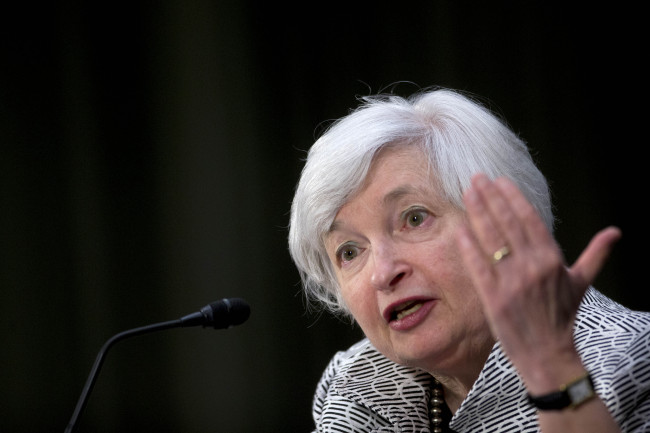WASHINGTON (AFP) ― The Federal Reserve could raise its key interest rate sooner than expected if the job market continues to make solid improvement, Fed Chair Janet Yellen said Tuesday.
“Although the economy continues to improve, the recovery is not yet complete,” Yellen said in the Fed’s semi-annual report to Congress.
Warning against “false dawns” in the five-year-old dragging recovery from the Great Recession, Yellen said the economy was moving toward the Fed’s dual goals of maximum employment and price stability of around 2 percent inflation.
After a sharp economic slump in the first quarter, largely due to severe weather, a recent spate of indicators on production and spending suggested that growth rebounded in the second quarter, “but this bears close watching,” she told the Senate Banking Committee.
The unemployment rate has fallen nearly 1.5 percentage points over the past year, and stood at 6.1 percent in June, while job growth that averaged about 230,000 a month over the first half of the year was a “somewhat stronger pace” than in 2013, she said.
 |
Janet Yellen, chair of the U.S. Federal Reserve, speaks during a Senate Banking Committee hearing in Washington, D.C., Tuesday. (Bloomberg) |
Yellen voiced concern that the labor market is still showing “significant slack” with a low participation rate, slow wage growth and a jobless rate still below the Fed’s estimate of a longer-run normal rate of 5.2-5.5 percent.
Inflation, though it has moved up in recent months, remains below the Fed’s longer-run 2 percent target, she said.
Yellen said the policy-setting Federal Open Market Committee was closely following the mixed economic signals to determine the future path of its near-zero federal funds rate target.
The rate has been pegged between zero and 0.25 percent since December 2008 to support the economy’s recovery by tamping down longer-term interest rates.
“If the labor market continues to improve more quickly than anticipated by the committee, resulting in faster convergence toward our dual objectives, then increases in the federal funds rate target likely would occur sooner and be more rapid than currently envisioned,” Yellen told lawmakers.
But, she said, the direction of interest rates “likely would be more accommodative than currently anticipated” if economic performance is disappointing.
Markets expect the first Fed rate hike to come in mid-2015, and Yellen said it would come “sometime in 2015.”
She stressed there was considerable uncertainty surrounding the Fed’s projections for economic growth, unemployment, and inflation.
“FOMC participants currently judge these risks to be nearly balanced but to warrant monitoring in the months ahead.”
Yellen outlined “substantial headwinds facing the economy” for lawmakers.
Income growth has been “exceptionally depressed,” the housing market recovery appears stalled amid tight credit conditions, and “unusually tight” government fiscal policy is holding back the U.S. recovery.
“The economy is operating significantly below potential ... that’s why we’re holding rates low,” she said, acknowledging that the low-rate environment also encourages more risk taking.
Yellen said that the central bank plans to stop pumping money into the economy through its asset-purchase program in October but that the wind-down was “not on a preset course.”
The FOMC has been tapering the quantitative easing program in incremental steps of $10 billion this year, bringing monthly bond purchases down from $85 billion in December to $35 billion in June.
The Fed, in its semiannual report to Congress, warned that some high-flying technology firms may be overvalued, but rejected the idea of a stock market bubble.
Stock values in some sectors “do appear substantially stretched ― particularly those for smaller firms in the social media and biotechnology industries, despite a notable downturn in equity prices for such firms early in the year,” the report said.
The main stock market indices moved into negative territory as Yellen testified. The tech-rich Nasdaq was the laggard, as tech shares like Yelp, Facebook, Pandora Media and Amgen tumbled after the Fed’s tech comment.
But the Fed suggested that the overall stock market is not in bubble territory despite recent record highs for broad indexes.
“Valuation measures for the overall market in early July were generally at levels not far above their historical averages, suggesting that, in aggregate, investors are not excessively optimistic regarding equities,” the report said.








